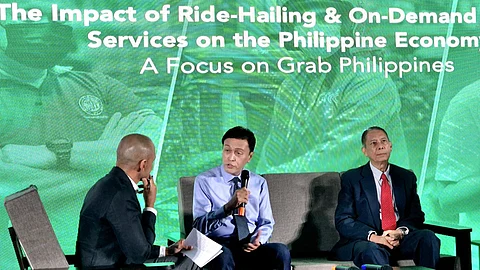
- NEWS
- the EDIT
- COMMENTARY
- BUSINESS
- LIFE
- SHOW
- ACTION
- GLOBAL GOALS
- SNAPS
- DYARYO TIRADA
- MORE

Filipino consumers are benefitting from the positive impact of everyday solutions and services provided by Grab Philippines as evidenced by a study conducted by the University of Asia and the Pacific's Center for Research and Communications, or UA&P-CRC.
Entitled, “The Impact of Ride-Hailing and On-Demand Delivery Services on the Philippine Economy: A Focus on Grab Philippines,” the study revealed how Grab created a multiplier effect for Filipinos and the economy.
The study found that Grab ranks third among seven transportation sectors, with a total output multiplier of 3.42, behind railways and air transportation.
This meant that for every peso spent on the Grab platform, an additional P3.42 is injected into the national economy, surpassing industry benchmarks and positioning Grab as a vital contributor within the transportation sector.
In simpler terms, a hypothetical P100-GrabCar ride generates an additional P342 for the economy — representing Grab's ability to amplify economic returns.
At the official launch of the study on Tuesday, Dr. Cid L. Terosa, UA&P Associate Professor, Senior Economist, and Input-Output Analysis Specialist, pointed out that Grab leverages its technology and portfolio of services to advance economic growth.
“Having the unique position as a superapp has allowed Grab to fully realize a multiplier effect that reverberates throughout the economy and the Filipino household,” he said.
From 2019 to 2021, Grab's services contributed between P37 billion and P165.6 billion to the economy — making up 0.07 percent to 0.3 percent of the national gross domestic product.
Additionally, each additional peso spent on Grab services stimulates a 44 centavos increase in national household income, extending beyond just ride or meal expenses.
The multiplier translates to a contribution of between P23.8 billion and P40.3 billion to total family income in the Philippines during the same period.
Effective job creation
From a macroeconomic standpoint, Terosa added that Grab's expansion of services align with the government's strategy to stimulate job creation and reduce poverty.
Grab's operations also played a significant role in reducing the average number of unemployed persons by 1.1 percent to 1.6 percent from 2019 to 2021.
Last month, Grab leaders visited Malacañang, and President Bongbong Marcos personally acknowledged the considerable contribution of the superapp to the country’s employment rate.
Commenting on the study, Grab Philippines Country Head Grace Vera Cruz said the company will work to further expand its economic contribution.
“We understand that much work needs to be done in further driving the nation forward, and we are eager and prepared to help usher in a new phase of inclusive growth and prosperity - with the support of our partners in the government and public sector, and our regulators,” Vera Cruz said.
Grab's services currently encompass more than 100 cities across the country. This year, Grab plans to expand its reach beyond Metro Manila by introducing its daily services to more cities and towns, fostering digital transformation.
